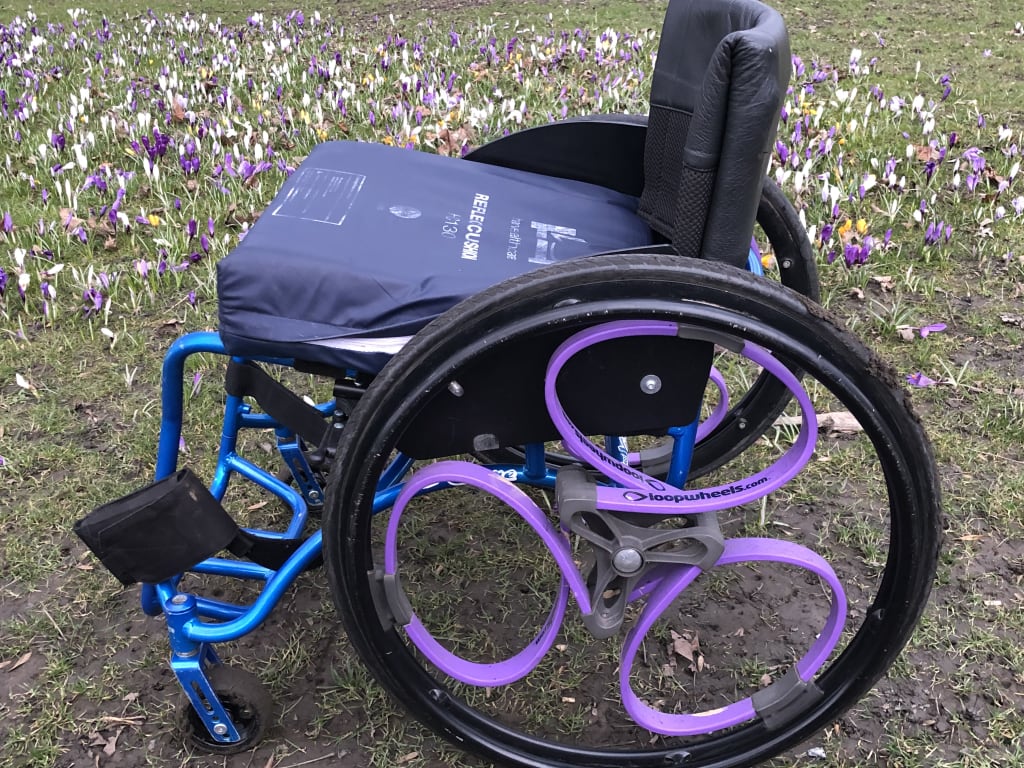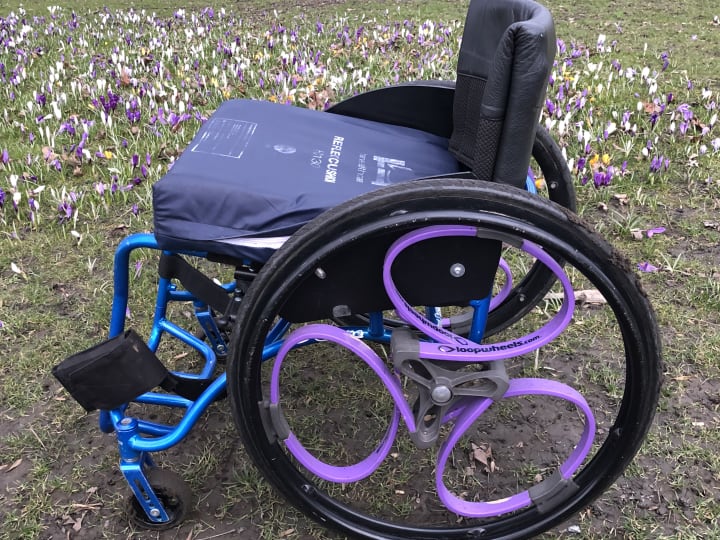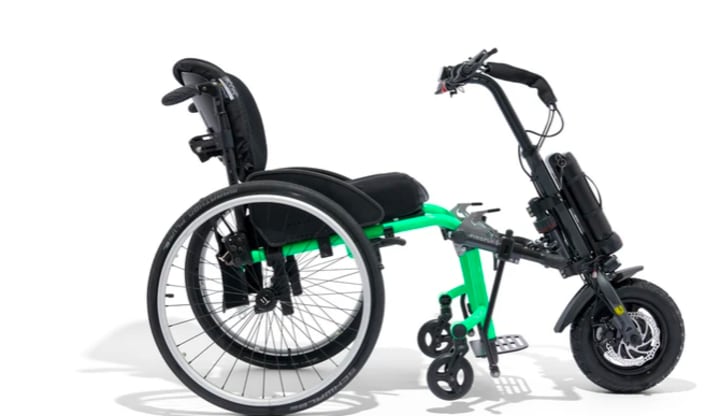Imagine Having To Pay To Leave Your Bed
When you’re a wheelchair-user, the line between necessity and frivolity is often as thin as a spoke on a wheel.

IMAGINE HAVING TO PAY TO LEAVE YOUR BED
Your alarm blares and your eyes fly open. You’re lying in bed, weighed down by a tangle of blankets, reluctant to glance at the clock. Perhaps there’s someone next to you; perhaps not. A hand strikes the Snooze button. You’re tempted to close your eyes and steal a few more hours of sleep, but you know that you need to get up. You need to move.
What if you can’t?
What if you can’t leave your bed? In fact, what if someone demands that you pay them hundreds, if not thousands, of dollars for the ability to leave your bed?
“That’s preposterous,” you splutter in indignation. “I need to move my body.”
Indeed. People tend to like moving their bodies, don't they? It’s only natural that you would want to move yours, as well. Does this mean that you’re going to spend the money? It’s your choice. Spend the money, so that you can move your body, or stay trapped in your bedroom.
“Could I get a doctor to help convince this money-launderer that I need to move, so that I may leave my bed, without paying as much?”
Of course! It will take many months, many forms, and your ultimate fate will be left to a person who can move their body without spending money.
“Months? I need to move, now.”
Fascinating.
It will take many months, many forms, and your ultimate fate—
This borderline-dystopic scenario is exactly what wheelchair-users face. It’s what many disabled people face. Imagine having to pay for the ability to leave your bed. Some do. Mobility aids cost money. Imagine having to pay to have arms or legs. Some do. Prosthetics cost money. Imagine having to pay to see. Do you wear glasses or contact lenses? You have paid somebody for the ability to see. The more one thinks about the cost of medical supplies and/or mobility aids, the more frustrated one becomes. For this writing piece, I will focus on the former: the egregious cost of wheelchairs and the oh-so-tempting accessories.
At first, a wheelchair might not seem excessively expensive, but money is subjective. A cheap hospital-esque wheelchair can cost $100. Some may see this as an affordable, and necessary, expense. Others may see this as a month’s worth of groceries and therefore not as high of a priority as the need to eat. Furthermore, a $100 wheelchair will only allow you to journey over modest terrains, is uncomfortable to sit in, and will often fall apart.
One could potentially invest in a more expensive chair, though this is solely dependent on the person’s financial resources and/or their ability to wait for the duration it would take for a medical assessment that might result in the chair being covered by insurance or charity.
For years, I experienced these disabling barriers. Yet, during the pandemic, I have experienced an entirely new problem: When you’re a wheelchair-user, the line between necessity and frivolity is often as thin as a spoke on a wheel.
Did I need to spend my student loan refund on a pair of LoopWheels, which allow me to move over cobblestones and other rough terrains?

Yes. I would argue that it was a necessity and money well-spent, as they have helped me cross many literal paths in my U.K.-Ph.D. journey:
Did I need to get a sportier-wheelchair (via Facebook), in order to ‘workout’ by wheeling through the streets and parks, when there’s nothing else to do during these lockdowns?

Arguably, no. I might have a few regrets. Other people wouldn't.
Should I buy this Firefly, which would turn my wheelchair into a motorcycle?

Absolutely not...but it’s a motorcycle! I can turn my wheelchair into a motorcycle! For thousands upon thousands of dollars, which I currently do not have. This attachment is worth 2.5x this competition’s grand prize. Still, one can dream about the sensation of zooming through the university, wind tousling my hair, music wafting through my headphones:

What about some nifty lights for my wheelchair? Perhaps I could buy one of these cool lap blankets? Or a bunch of shirts that let everyone know that I’m disabled, in case the chair beneath me wasn’t an obvious give-away? Maybe! Why not? What is the line between frivolity and necessity?
Therein lies the problem: it is easy to convince yourself that frivolity is a necessity, and sometimes it is. Sometimes, though, you have to empty the cart.
Sometimes, I have to empty the cart, and remind myself that it was just a few years ago, when I was struggling to pay for a standard, hospital-esque, wheelchair. Mere years since I've fought to pay for the ability to leave my bed. It's easy to forget. Social media often makes you forget. Social media groups, especially ones geared towards disabled people, love to promote these accessories and frivolities, for a good reason. These are fun products, these are fashionable products, these are good products. Yet, it’s hard to not feel that twinge of guilt, when you buy an accessory, knowing that someone else might not be able to afford the chair.
Still, it is a nice shirt, and those are some radical lights, and who wouldn’t want to turn their wheelchair into a motorcycle? So, we glance at our bank accounts, and we allow the smiles to spread across our faces, and we Add To Cart.
About the Creator
Burgandi Rakoska
Burgandi Rakoska is a disabled author who is currently undertaking a PhD at the University of Leeds, having graduated from Columbia University, Teachers College. Burgandi writes disability representation like she's running out of time...






Comments
There are no comments for this story
Be the first to respond and start the conversation.